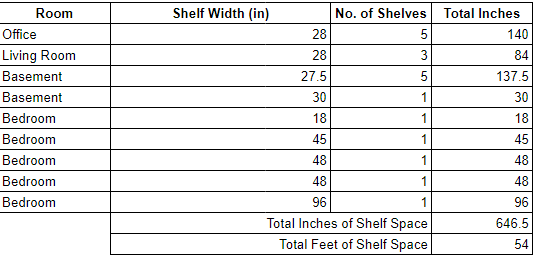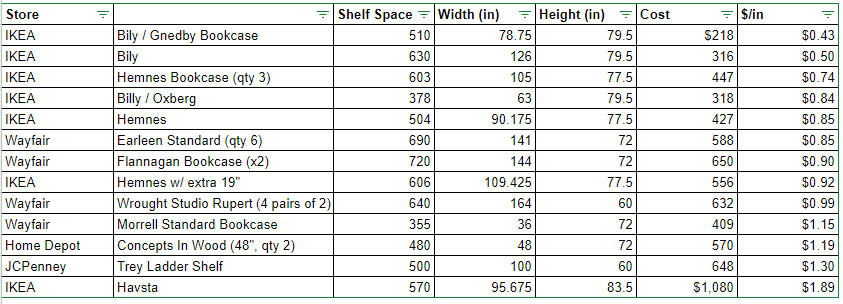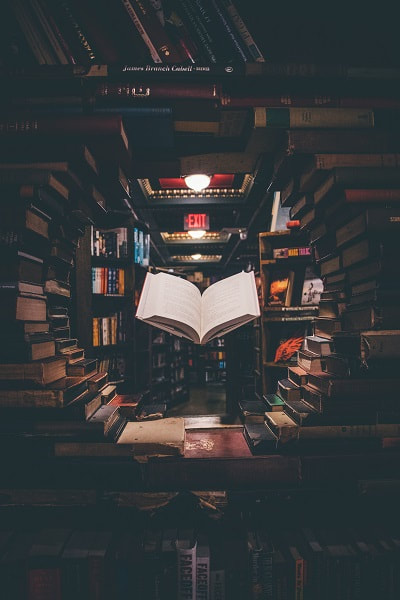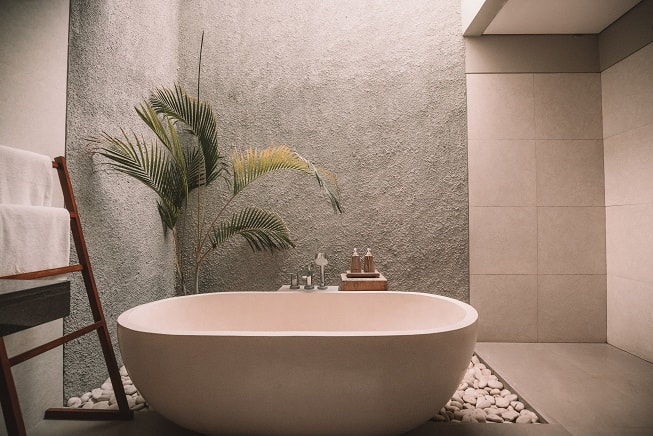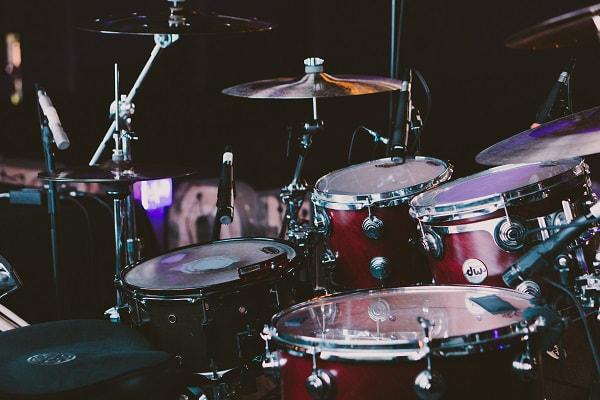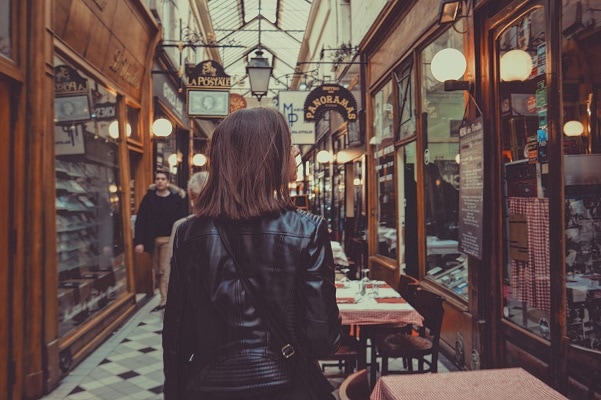|
I’m going to look like a complete hypocrite, but I bought four large bookshelves. Yes, I realize what my headline says at the top of my blog but something had to be done. We love books in this family and I realized we had them in nearly every room of the house. There was a bookshelf in the office, another in the basement, and shelves in each kid’s bedrooms. My daughter also has those cool floating shelves I wrote about last year. For books, we have everything from board books to graduate level math and engineering textbooks. Then of course, there are the antique books I rescued from my grandparent’s farm. I wanted them all in one place. I wanted a library. Since I’m an engineer, I used the same tactic in bookshelf shopping that I used to reduce the amount of coffee I drink. In other words, I made a spreadsheet. How does a spreadsheet help you shop for bookshelves? If you’ve shopped online for bookshelves lately, you will find the choices are overwhelming. I had to narrow it down somehow based on my space and budget. I didn’t want to start putting books on my shelves only to find out I didn’t have room for all of them. I grabbed my tape measure and went all over the house measuring the shelves we have and tracking it all in a spreadsheet. I even measured the stacks of books in my daughter’s room. Then I added it all up to find that I needed about 650 inches or 54 feet of shelf space. I assumed that the kids would keep some books in their rooms and that I would also donate at least some books in the process so I could go with a little less if needed. Below is the table I used to estimate how much shelf space I needed. The location I chose gave me a wall ten feet wide with a ceiling height of about 8 ft. Looking at my spreadsheet, I knew that if I had just six shelves that were nine feet across, I should have enough space. This helped me narrow down the search. I looked at several bookshelves that could meet my needs but I needed a good way to compare them. I used my spreadsheet to calculate the number of inches of shelf space and divided that by the total cost. This gave me a $/inch value to compare each with. When I found the right combination of width and number of shelves to get close to my 650 inches of shelf space, and found the right price I had a winner. Here is my table sorted by $/inch. If you’re curious, I settled on the Hemnes from IKEA. This is actually four bookshelves, two are 33 ½” and two are about 17” wide. Each has six shelves. I decided it gave me the closest to my 650 inches and still kept the cost reasonable. Granted, a simple cost comparison doesn’t take into account the quality difference between these. I tried to find ones that were fairly comparable. If your budget allows you to get custom shelves made or you have the time and skill to build them yourself then more power to you.
Actually getting the shelves from IKEA in the middle of a pandemic proved much more difficult than expected but ultimately we got them and I’m happy.. My oldest son did a good job putting the shelves together. To keep them from falling on anyone, we attached them to the wall with safety straps screwed into the studs. These also helped line all four shelves up so that it looks like one large bookcase. Before I filled the shelves up though, I wanted a way to help organize the books. Come back to read part 2 for my review of library apps to organize your book collection. I know I keep saying you don’t need more bookshelves but I absolutely had to do something with my daughter’s bedroom. She has a tiny bedroom compared to everyone else in our house but reads more than anyone I’ve ever met. It’s not uncommon for her to have bookmarks in 4 or 5 books at any given time. When she’s in trouble, the only threat that she cares about is the threat of locking all her books in a trunk. The only thing that has prevented me from doing it at times is the sheer volume of them. To finally wrangle some of the piles of books, I found some shelves that worked out pretty well. I love these "invisible" shelves. I ordered a three pack of these Umbra Conceal floating bookshelves. They come in two sizes and you can order either a three-pack or individual shelves. I love their simplicity and that fact that when you stack a few books on them, you can't see them. They’re also fairly inexpensive yet seem really sturdy. They allow you to basically make art out of your book collection while keeping them easily accessible. If you’re wondering how they hold the cover closed on the bottom book, there are small hooks that hold the cover. This means also that the bottom book must be large enough for the shelf to slide into so the cover can go into those hooks. That’s why they come in two sizes. It wasn’t a problem for us. Additionally, I used a stud finder and longer screws to mount each one directly to a stud. They’re not going anywhere even with several hardcover books on them. If I wasn't attaching them directly to a stud, I think I would still use longer screws with drywall anchors. I still suggest you pare down your book collection as much as possible before buying more shelves, but books are something that I’m OK with having around. Maybe it has something to do with the years I worked for Borders book stores. If you’re interested in buying some, below are affiliate links to get them on Amazon. Thanks for reading.
As I mentioned in an earlier post, I’ve been reading more about happiness lately and trying to put into practice some of the things I’m learning. I recently finished the book Happier At Home by Gretchen Rubin and I’m looking forward to reading some of her other books on the subject. I liked the approach of Happier At Home where she dedicated each month to a specific aspect of life to focus on improving her happiness. She began in September which sounds odd except that she has two school age daughters. Like most parents, watching your kids go off to school each fall feels a lot more like a new stage in life than January 1st ever does. The topics Gretchen chose for this project were:
As she goes through each month, she echoes a lot of the lessons learned in her earlier book, The Happiness Project. I admit I wish I would have read that first but it’s not absolutely necessary. She reviews many of those lessons and what she calls “The Eight Splendid Truths” about happiness whenever they apply. There is also a section at the end of the book listing them all together in more detail. Two of my favorites were truth number 3 and 6. They are great words to live by.
A few other nuggets I pulled from Happier At Home were ideas she had like celebrating holiday breakfasts with your family. Some holidays like Valentine’s Day are difficult to celebrate as a family but she realized they generally were all together at breakfast. She went all out for fancy breakfasts with decorations for several holidays. That doesn’t work for everyone but it’s a cool idea. I wouldn’t say I’m necessarily a happier person after reading the book but Gretchen definitely lays out a lot of ideas for you to think about. Remember, I write these posts as much for myself as I do for others. I know darn well I need to keep reminding myself of the two Truths above when I get so frustrated with my kids. It’s a process, maybe you could call it a journey even, but I don’t think happiness is necessarily a destination. It takes work and positive thinking. There will always be good and bad times, and different aspects of your life to focus on. The monthly topics listed above may not be the same topics you or I would choose to focus on right now, but in a section at the end, she encourages everyone to embark on their own unique happiness project. Good luck with yours. I would encourage you take a look at her website, Gretchen has lots of additional resources to help you out including a podcast. Do musical instruments count as clutter? I’m asking for a friend. One of my sisters can’t seem to stop bringing home animals while we can’t seem to stop turning our house into a musical instrument sanctuary. Some of them get used regularly and some rarely get touched. I’m just as guilty as anyone for bringing them in. I have an electric guitar and amplifier that I haven’t touched in months. It turns out the guitar is much harder to learn than I ever imagined. I’m also the one who spotted the 1950’s Hammond Organ on the curb and suggested we bring it home. That turned out to be much heavier than I ever imagined. After some oil it worked beautifully for our kids to practice their piano lessons. Eventually though, their teacher suggested they get a real piano to practice on so now we have a full size upright piano as well. I’m not allowed to get rid of the organ because my son insists that he plays it. I think he just moves the bench occasionally to make it look like someone has used it. Did I mention that he also plays the viola? We have two of those. He plays percussion in the high school band so we have the standard percussion kit of bells and drum pad. We even broke down and bought a full drum set since I did all that work to clear out the family room. Now that my daughter is in middle school, she started playing saxophone in the school band. Occasionally, she even breaks out her old recorder from 4th grade too. Honestly, I don’t mind all of these instruments, as long as they get used. Similar to wasted talent, a musical instrument is a terrible thing to waste by having it sit around collecting dust. All musical instruments require at least some maintenance, even if it’s just dusting. The organ requires occasional oiling, the piano requires tuning a couple times a year, the drum set needs to be cleaned and tuned, the saxophone needs reeds, and the viola needs rosin and strings. But are they clutter? I guess I would say NO - as long as they are being enjoyed and properly cared for. In my case, I would like to get rid of the organ because it takes a lot of space and collects dust. I also should just get rid of my guitar because I never play it. It’s left-handed so no one else in the family is going to either. I love hearing my kids play the piano, viola, saxophone, and even the drum set. I hope that my kids continue to play for the rest of their lives but at the same time I know that we should reduce the number of musical instruments we have sitting around. I know it will save us space and money but they’re proving as difficult to part with as books. That guitar I’ve been meaning to learn how to play is a lot like those books I’m going to read someday. I found a good quote about someday by author Jacqueline Woodson:
Somewhere there is another person who would like to read that book or play that old Hammond organ. So whether it’s a musical instrument, a book, or whatever it is you’ve been meaning to do SOMEDAY, I think NOW is the time to either start taking it seriously and do it, or just pass it along to someone else. As I just wrote that, another quote came to mind that I think sums it up nicely. It’s one of my favorites that I heard many times growing up:
It feels good to exercise our willpower muscle. I think it’s like our other muscles in that we have to exercise it once in a while to strengthen it. Otherwise our willpower gets weak. I’m happy to say I’m the proud non-owner of a few things lately. I recently bought a new pair of shoes so I got rid of two pair. I loved the new ones so much that I when I got an email that they were having a sale, I thought I should probably get another pair. I even had them in my online cart but finally decided against it. If they had a sale once, they’ll have it again sometime. When these are getting worn out, I’ll think about buying another pair. You may have noticed that have written multiple posts about books. I have a weakness for them and have difficulty resisting cheap or free ones. That makes it difficult when I’m at the local library and they have shelf after shelf filled with used books for sale at 50 cents each. A few months ago I bought an organizing book there hoping for some new ideas and inspiration. So far, it’s been a little disappointing but I’m still hopeful. However, I have resisted buying several other books that caught my eye so that must count for something. The biggest and most expensive thing I’ve managed not to own lately though was a camper. I keep thinking that it would be fun to take trips in an RV or a camper. I guess I have visions of the kids lounging on the couch or bed in an RV rather than buckled into the backseat of our SUV. I picture having all of our stuff packed in drawers and closets so that when we arrive somewhere it’s all available, rather than me making 14 trips to the car to carry in all the suitcases, backpacks, and sleeping bags. Then, reality sets in and I think about how it really will be. My kids will be fighting and wrestling, not sitting quietly. Our stuff won’t be stored neatly. They’ll have things all over the place. Then, there’s the maintenance. An RV is basically a small house combined with a truck. Both of them need to be maintained and can have expensive problems. I can’t even keep up with maintenance on the house I live in, much less a second one with wheels and an engine. It still sounds like it could be fun, but I’m glad I didn’t rush to buy one right now. So there you go. Three things that I’m happy to say I didn’t buy. It actually feels pretty good to know I still have that money I almost spent on something I didn’t need and I don’t have to find time and space in my life for them. Unfortunately, I don’t think exercising my willpower counted as real exercise and it certainly isn’t going to help me run that 5K I have coming up in a few weeks. However, I think it is important. You should try it sometime. |
Details
Categories
All
Copyright Dave Lubke and www.davelubke.com, 2022
This website uses marketing and tracking technologies. Opting out of this will opt you out of all cookies, except for those needed to run the website. Note that some products may not work as well without tracking cookies. Opt Out of Cookies |
This website is built on the Weebly platform.
To build your own free website with Weebly, click the link below.
To build your own free website with Weebly, click the link below.



